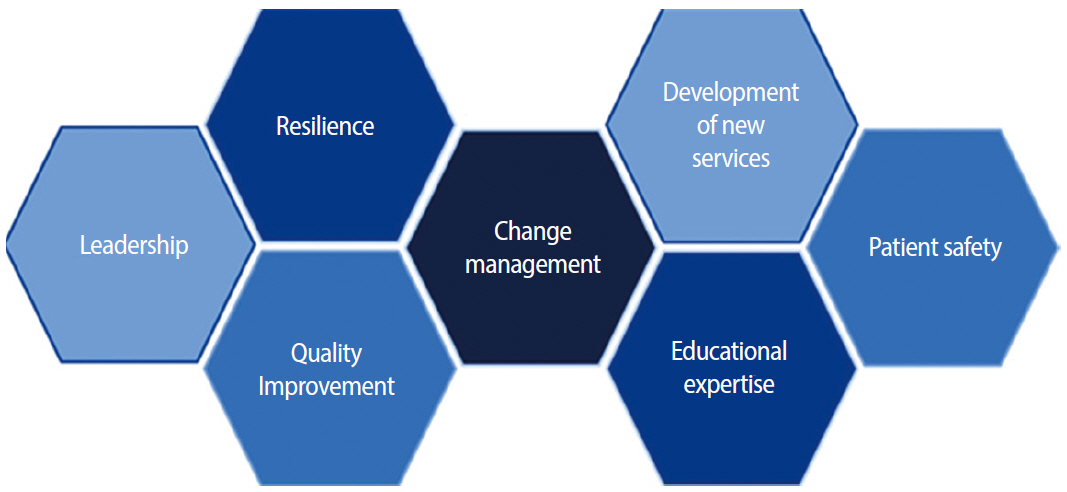J Educ Eval Health Prof.
2015;12:31. 10.3352/jeehp.2015.12.31.
How can a postgraduate professional education and development course benefit general practitioners?: a qualitative study
- Affiliations
-
- 1Health Education North West, Manchester, United Kingdom. steven.agius@nw.hee.nhs.uk
- 2University of Central Lancashire, United Kingdom.
- 3Lancashire Area Team (NHS England), Preston, United Kingdom.
- KMID: 2402038
- DOI: http://doi.org/10.3352/jeehp.2015.12.31
Abstract
- PURPOSE
The rationale for 'professional education and development' (PED) courses is to support general practitioners, enabling them to access a range of theoretical and practical skills within a supportive schema. It aims to identify whether and how a regional PED course has had a beneficial impact upon participants.
METHODS
The study comprised a qualitative investigation of participants' assessed coursework portfolios. The content of each portfolio gives individual accounts of the impact of the course on personal and practice development. Permission to access extant portfolios was obtained from 16 recent alumni of the course. The anonymous written material was analysed by the research team for recurring discourses and themes using a thematic framework analysis.
RESULTS
Seven major thematic categories were extrapolated from the data: leadership, resilience, quality improvement, change management, development of new services, educational expertise, and patient safety. In each category, we found evidence that the course enabled development of practitioners by enhancing knowledge and skills which had a positive impact upon their self-perceived effectiveness and motivation.
CONCLUSION
Extended specialty training is on the horizon but such courses may still serve a valuable purpose for current trainees and the existing general practitioners workforce which will be responsible for leading the shift towards community-based service delivery.
Keyword
MeSH Terms
Figure
Reference
-
1. Baron R, McKinlay D, Martin J, Ward B, Whiteman I. Higher professional education for GPs in the North West of England: feedback from the first three years. Educ Prim Care. 2001; 12:421–429.2. Ritchie J, Spencer L, O’Connor W. Carrying out qualitative analysis. In : Ritchie J, Lewis J, editors. Qualitative research practice. London: SAGE Publications;2011. p. 218–262.3. Bryman A. Social research methods. Oxford: Oxford University Press;2008. p. 748.4. NHS Institute for Innovation and Improvement & Academy of Medical Royal Colleges. Medical leadership competency framework [Internet]. London: NHS Institute for Innovation and Improvement;2010. [cited 2014 Sep 17]. Available from: http://www.leadershipacademy.nhs.uk/wp-content/uploads/2012/11/NHSLeadership-Leadership-Framework-Medical-Leadership-Competency-Framework-3rd-ed.pdf.5. The King’s Fund & Nuffield Trust. Securing the future of general practice: new models of primary care [Internet]. London: Nuffield Trust;2013. [cited 2014 Sep 17]. Available from: http://www.nuffieldtrust.org.uk/sites/files/nuffield/130718_securing_the_future_of_general_practice-_full_report_0.pdf.6. The Royal College of General Practitioners. The 2022 GP: a vision for general practice in the future NHS [Internet]. London: The Royal College of General Practitioners;2013. [cited 2014 Sep 17]. Available from: http://www.rcgp.org.uk/campaign-home/~/media/Files/Policy/A-Z-policy/The-2022-GP-A-Vision-for-General-Practice-in-the-Future-NHS.ashx.7. Greenaway D. Shape of training: securing the future of excellent patient care [Internet]. London: General Medical Council;2013. [cited 2014 Sep 17]. Available from: http://www.shapeoftraining.co.uk/static/documents/content/Shape_of_training_FINAL_Report.pdf_53977887.pdf.8. Agius S, Lewis B, Kirk B, Hayden J. The perceived benefits of a two-year period of extended specialty training in general practice: the trainees’ perspective. Educ Prim Care. 2014; 25:26–35.
Article
- Full Text Links
- Actions
-
Cited
- CITED
-
- Close
- Share
- Similar articles
-
- Nurse's Perception of Technological Development and Professional Self-Concept
- Continuing medical education as a national strategy to improve access to primary care in Saudi Arabia
- Trends Analysis on Research Articles in the Korean Journal of Medical Education
- Professional Self-Concept and Self-Efficacy according to the Need for Advanced Practice Nurse among Korean Nurses
- NHS Hospital Pharmacist Training Programme in UK


